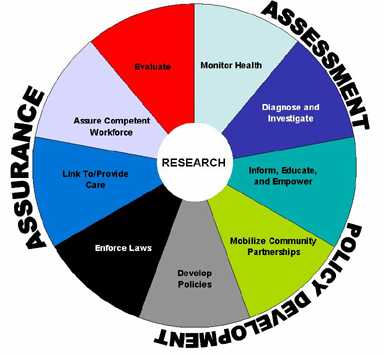Core Functions of Public Health and How They Relate to the 10 Essential Services
This website is archived for historical purposes and is no longer being maintained or updated.
Historical Document
Continuation of EPHLI is subject to availability of funds; the institute is not active at this time. This information is provided ONLY as a historical reference for the public health community. These pages are no longer being maintained and the data may no longer be current and/or accurate.
NOTE: For current tools to help your program fill performance gaps and contribute to larger performance improvement efforts such as voluntary public health accreditation, visit our Resources Organized by the Essential Services page.
This page and graphic show how the ten essential environmental health services align with the three core functions of public health (assessment, policy development, and assurance).
Assessment
- Monitor environmental and health status to identify and solve community environmental health problems
- Diagnose and investigate environmental health problems and health hazards in the community
Policy Development
- Inform, educate, and empower people about environmental health issues
- Mobilize community partnerships and actions to identify and solve environmental health problems
- Develop policies and plans that support individual and community environmental health efforts
Assurance
- Enforce laws and regulations that protect environmental health and ensure safety
- Link people to needed environmental health services and assure the provision of environmental health services when otherwise unavailable
- Assure a competent environmental health workforce
- Evaluate effectiveness, accessibility, and quality of personal and population-based environmental health services
- Research for new insights and innovative solutions to environmental health problems

- Page last reviewed: May 25, 2011 (archived document)
- Content source:


 ShareCompartir
ShareCompartir